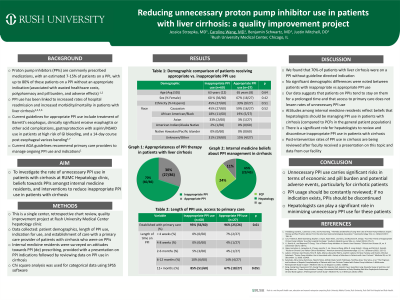Tuesday Poster Session
Category: Liver
P3851 - Rates of Unnecessary Proton Pump Inhibitor Use in Patients With Liver Cirrhosis and a Survey of Internal Medicine Residents: A Quality Improvement Project
Tuesday, October 24, 2023
10:30 AM - 4:00 PM PT
Location: Exhibit Hall

Has Audio
.jpg)
Caroline Wang, MD
Rush University Medical Center
Chicago, IL
Presenting Author(s)
Jessica Strzepka, MD, Benjamin Schwartz, MD, Caroline Wang, MD, Justin Mitchell, DO
Rush University Medical Center, Chicago, IL
Introduction: Proton pump inhibitors (PPIs) are relatively safe and commonly used. Overprescription has led to economic and pill burden, with ongoing concerns for potential adverse effects. Emerging data shows concerns about PPI use in patients with liver cirrhosis leading to higher rates of infections, hepatic encephalopathy, and mortality. American Gastroenterological Association guidelines specify that primary care providers (PCP) are responsible for reviewing and documenting PPI indications. Studies have shown variable unnecessary PPI use rates, 20-86%, in patients with liver cirrhosis. We present preliminary data from an ongoing quality improvement project to reduce the rate of unnecessary PPI use in patients with liver cirrhosis.
Methods: This is a single center quality improvement project. Patients with cirrhosis seen in hepatology clinic at a tertiary care medical center were reviewed, and those on PPI therapy were included. Demographics, length of PPI use, indication, and primary care follow up was collected. Internal medicine residents were surveyed on their attitudes towards PPI use following a presentation regarding PPI indications and current data on PPI use in patients with liver cirrhosis. Statistical analysis was done with chi square analysis using SPSS software.
Results: A total of 146 patient were reviewed, 86 were found to be on a PPI, and 70% (60/86) were found to be on a PPI without a guideline-directed, documented indication. There were no significant differences in demographics between the total population of cirrhotic patients on PPI therapy compared to those with unnecessary PPI use. 85% (51/60) of patients on unnecessary PPIs were on them for over a year, and 93% (56/60) of these patients were established with a PCP. 43 internal medicine residents were surveyed. When asked who is responsible for reviewing PPI use and indication in patients with liver cirrhosis, residents answered: 65% (28/43) hepatology, 26% (11/43) PCP, and 9% (4/43) gastroenterology. In comparison, when asked who is responsible for reviewing PPI use and indication in a general patient population, residents answered: 84% (36/43) PCP and 16% (7/43) gastroenterology.
Discussion: Our findings show patients with cirrhosis have high rates of unnecessary, long term PPI use despite access to primary care. Given concern for potential harms, reduction of unnecessary PPI use in this population is recommended. Further attention to this matter by hepatologists may reduce unnecessary PPI use in this patient population.
Disclosures:
Jessica Strzepka, MD, Benjamin Schwartz, MD, Caroline Wang, MD, Justin Mitchell, DO. P3851 - Rates of Unnecessary Proton Pump Inhibitor Use in Patients With Liver Cirrhosis and a Survey of Internal Medicine Residents: A Quality Improvement Project, ACG 2023 Annual Scientific Meeting Abstracts. Vancouver, BC, Canada: American College of Gastroenterology.
Rush University Medical Center, Chicago, IL
Introduction: Proton pump inhibitors (PPIs) are relatively safe and commonly used. Overprescription has led to economic and pill burden, with ongoing concerns for potential adverse effects. Emerging data shows concerns about PPI use in patients with liver cirrhosis leading to higher rates of infections, hepatic encephalopathy, and mortality. American Gastroenterological Association guidelines specify that primary care providers (PCP) are responsible for reviewing and documenting PPI indications. Studies have shown variable unnecessary PPI use rates, 20-86%, in patients with liver cirrhosis. We present preliminary data from an ongoing quality improvement project to reduce the rate of unnecessary PPI use in patients with liver cirrhosis.
Methods: This is a single center quality improvement project. Patients with cirrhosis seen in hepatology clinic at a tertiary care medical center were reviewed, and those on PPI therapy were included. Demographics, length of PPI use, indication, and primary care follow up was collected. Internal medicine residents were surveyed on their attitudes towards PPI use following a presentation regarding PPI indications and current data on PPI use in patients with liver cirrhosis. Statistical analysis was done with chi square analysis using SPSS software.
Results: A total of 146 patient were reviewed, 86 were found to be on a PPI, and 70% (60/86) were found to be on a PPI without a guideline-directed, documented indication. There were no significant differences in demographics between the total population of cirrhotic patients on PPI therapy compared to those with unnecessary PPI use. 85% (51/60) of patients on unnecessary PPIs were on them for over a year, and 93% (56/60) of these patients were established with a PCP. 43 internal medicine residents were surveyed. When asked who is responsible for reviewing PPI use and indication in patients with liver cirrhosis, residents answered: 65% (28/43) hepatology, 26% (11/43) PCP, and 9% (4/43) gastroenterology. In comparison, when asked who is responsible for reviewing PPI use and indication in a general patient population, residents answered: 84% (36/43) PCP and 16% (7/43) gastroenterology.
Discussion: Our findings show patients with cirrhosis have high rates of unnecessary, long term PPI use despite access to primary care. Given concern for potential harms, reduction of unnecessary PPI use in this population is recommended. Further attention to this matter by hepatologists may reduce unnecessary PPI use in this patient population.
Disclosures:
Jessica Strzepka indicated no relevant financial relationships.
Benjamin Schwartz indicated no relevant financial relationships.
Caroline Wang indicated no relevant financial relationships.
Justin Mitchell indicated no relevant financial relationships.
Jessica Strzepka, MD, Benjamin Schwartz, MD, Caroline Wang, MD, Justin Mitchell, DO. P3851 - Rates of Unnecessary Proton Pump Inhibitor Use in Patients With Liver Cirrhosis and a Survey of Internal Medicine Residents: A Quality Improvement Project, ACG 2023 Annual Scientific Meeting Abstracts. Vancouver, BC, Canada: American College of Gastroenterology.
